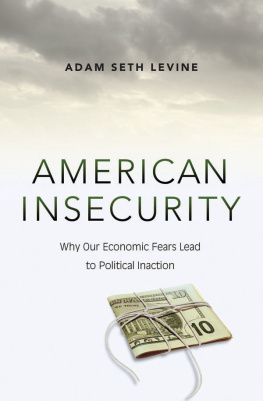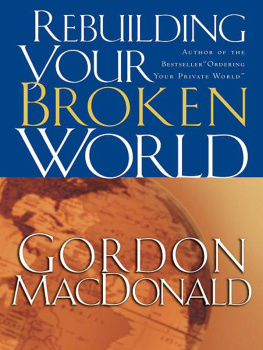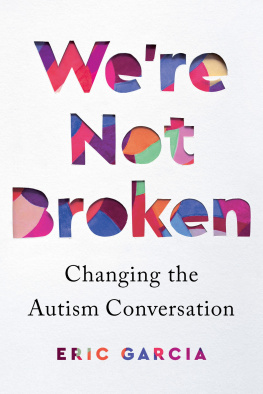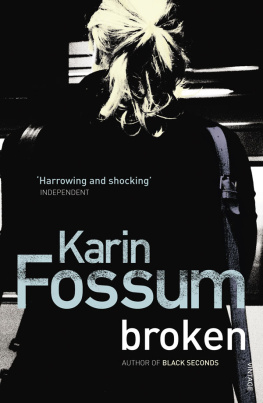Levine - Broken Windows, Broken Business
Here you can read online Levine - Broken Windows, Broken Business full text of the book (entire story) in english for free. Download pdf and epub, get meaning, cover and reviews about this ebook. year: 2010, publisher: Grand Central Publishing, genre: Politics. Description of the work, (preface) as well as reviews are available. Best literature library LitArk.com created for fans of good reading and offers a wide selection of genres:
Romance novel
Science fiction
Adventure
Detective
Science
History
Home and family
Prose
Art
Politics
Computer
Non-fiction
Religion
Business
Children
Humor
Choose a favorite category and find really read worthwhile books. Enjoy immersion in the world of imagination, feel the emotions of the characters or learn something new for yourself, make an fascinating discovery.

Broken Windows, Broken Business: summary, description and annotation
We offer to read an annotation, description, summary or preface (depends on what the author of the book "Broken Windows, Broken Business" wrote himself). If you haven't found the necessary information about the book — write in the comments, we will try to find it.
Broken Windows, Broken Business — read online for free the complete book (whole text) full work
Below is the text of the book, divided by pages. System saving the place of the last page read, allows you to conveniently read the book "Broken Windows, Broken Business" online for free, without having to search again every time where you left off. Put a bookmark, and you can go to the page where you finished reading at any time.
Font size:
Interval:
Bookmark:
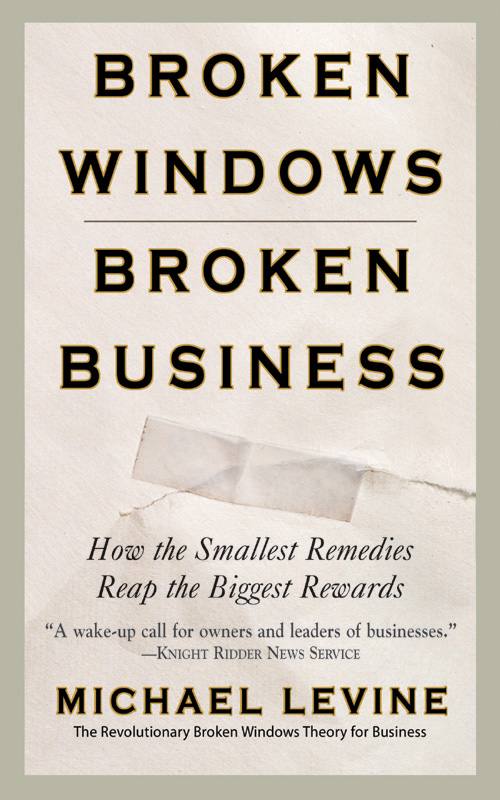
Copyright 2005 by Michael Levine
All rights reserved.
Warner Business Books
Warner Books
Hachette Book Group
237 Park Avenue
New York, NY 10017
Visit our website at www.HachetteBookGroup.com
The Warner Business Books logo is a trademark of Warner Books.
First eBook Edition: April 2010
ISBN: 978-0-446-53558-8
To the champions, the heroic men and women who understand that business is more than the toil for moneyit is a demand for excellence. Their rare passion in the cause of commerce inspires all of those inside and out of their enterprise, and to them this book is enthusiastically dedicated.
Its been said before, better and more forcefully than I can, that writing a book is not a solitary undertaking. Its encouraged, refined, assisted, and expanded by any number of smart, passionate, inspiring people, who sometimes do the most when they dont realize theyre doing anything at all. Such is the process of writing a book, at least for me.
To each of these benevolent witnesses, my gratitude, real and lasting:
Rick Wolff, my determined, diligent editor at Warner Books, whose contributions to the birth of this work were indispensable.
Craig Nelson, my longtime and valued agent and friend, who has watched over my publishing life with the care of a dedicated and experienced surgeon.
Jeffrey Cohen, a smart and valued friend, who continues to encourage my writing.
My LCO-Levine Communications Office staff and associates, headed by Chief Operating Officer Dawn Miller. Staff: Mike Abrams, Clarissa Clarke, Liam Collopy, Shannon Hartigan, and Brian McWilliams. Associates: Rick Citron, Cindy Carrasco, Phil Kass, Steve Shapiro, and David Weiss.
My closest personal friends, every single one of whom has brightened darkness when life has inevitably cast shadows, but just as often celebrated my victories as if they were their own: Peter Bart, Adam Christing, Craig Hollander, Richard Imprescia, Karen Karsian, Nancy Mager, John McKillop, Mark Miller, Evadne Morakis, Cable Neuhaus, Alyse Reynolds, Tara Kennan, Dr. Robert Kotler, and Lisa Yukelson.
Publishing associates far and wide, who continue to use their formidable skills to prod me to get my ideas into print: Craig Black, Bill Hartley, and Michael Viner.
When is a dirty bathroom a broken window?
No, thats not a riddle. Its a question that could today be at the core of a businesss success or failure. Answer that question correctly and use that answer as a beacon, and your business could dominate its competition indefinitely. Ignore the solution to the puzzle, and you will be condemning your business to failure in a very short period of time.
The broken windows theory, first put forth by criminologists James Q. Wilson and George L. Kelling in a piece called Broken Windows in the Atlantic Monthly magazine in March 1982, explains what a broken window is in criminal justice terms. But the brilliance of that theory goes much further than one interpretation. It can and should be applied to business, too, and it can make a critical differenceif American businesses will simply take the time and have the courage to notice.
When Wilson and Kelling first unveiled the theory, the idea of concentrating on seemingly petty criminal acts like graffiti or purse snatching seemed absurd: How would a crackdown on jaywalking lead to a decrease in murders?
The broken windows theory states that something as small and innocuous as a broken window does in fact send a signal to those who pass by every day. If it is left broken, the owner of the building isnt paying attention or doesnt care. That means more serious infractionstheft, defacement, violent crimemight be condoned in this area as well. At best, it signals that no one is watching.
This is the heart of the broken windows theory: Wilson and Kelling write that social psychologists and police officers tend to agree that if a window in a building is broken and is left unrepaired, all the rest of the windows will soon be broken. Why? Because the message being sent out by a broken windowthe perception it invitesis that the owner of this building and the people of the community around it dont care if this window is broken: They have given up, and anarchy reigns here. Do as you will, because nobody cares.
Wilson and Kelling suggested that a broken windowany small indication that something is amiss and not being repairedcan lead to much larger problems. It sends signals, they said, that the bad guys are in charge here; no one cares about maintaining some kind of order, and anyone who wishes to take advantage of that situation would be unopposed. It leads to lawlessness, a kind of anarchy by neglect.
Just as physicians now recognize the importance of fostering health rather than simply treating illness, so the policeand the rest of usought to recognize the importance of maintaining, intact, communities without broken windows, wrote Wilson and Kelling.
Years later, Wilson told me that the idea behind the broken windows theory had to do with the responsibility of the police to take seriously small signs of disorder because people were afraid of disorder, and there was a chance disorder could lead to more serious crime. Still, critics of the theory greeted it with skepticism, believing that attention to small infractions would necessarily decrease the amount of attention that could be devoted to much more serious crimes.
The same objection, in slightly less genteel verbiage, was raised when Rudolph Giuliani, the newly elected mayor of New York City in 1994, announced his intention to eliminate graffiti on subway cars and move the hookers and pimps out of Times Square, to make Manhattan more family-friendly. Critics practically laughed in Giulianis face, intimating that the law and order mayorwho had been elected based largely on his experience as U.S. attorney for the New York areawas dealing with the small crimes because he knew he couldnt contain the larger ones.
They were proved wrong. Giuliani and his new police commissioner, William Bratton, believed that if they sent out clear signals to criminals, and to New Yorks citizenry generally, that a zero tolerance policy would be applied to all crime in the city, the result would be a safer, cleaner city. And the statistics bore them out: Over the following few years, the numbers of murders, assaults, robberies, and other violent crimes all went down dramatically. And it had all started with graffiti on subway cars.
I can hear you asking, What does that have to do with my business? Its all about crime and criminals.
That same theory is applicable to the world of business. If the restroom at the local Burger King is out of toilet paper, it signals that management isnt paying attention to the needs of its clientele. That could lead the consumer to conclude that the food at this restaurant might not be prepared adequately, that there might be health risks in coming here, or that the entire chain of fast food outlets simply doesnt care about its customers.
Given that scenario, it is not a stretch of the imagination but in fact a point of logic to conclude that the broken windows theory should be applied to business, as it was to the problems of crime in urban areas. Certainly, the perception of the average consumer is a vital part of every business, and if a retailer, service provider, or corporation is sending out signals that its approach is lackadaisical, its methods halfhearted, and its execution indifferent, the business in question could suffer severeand in some cases, irreparablelosses.
This book is about broken windows in business: how they happen, why they happen, why they are ignored, and the fatal consequences that can result from their being allowed to go unchecked. It is meant as a cautionary tale, a primer, a road map, a manifesto, and a salute to those companies that fix their broken windows promptly. It will explore not only specific examples of broken windows, how they occurred, and what their long-term results were but also the culture that creates an environment in which windows are broken and left unfixed.
Font size:
Interval:
Bookmark:
Similar books «Broken Windows, Broken Business»
Look at similar books to Broken Windows, Broken Business. We have selected literature similar in name and meaning in the hope of providing readers with more options to find new, interesting, not yet read works.
Discussion, reviews of the book Broken Windows, Broken Business and just readers' own opinions. Leave your comments, write what you think about the work, its meaning or the main characters. Specify what exactly you liked and what you didn't like, and why you think so.





